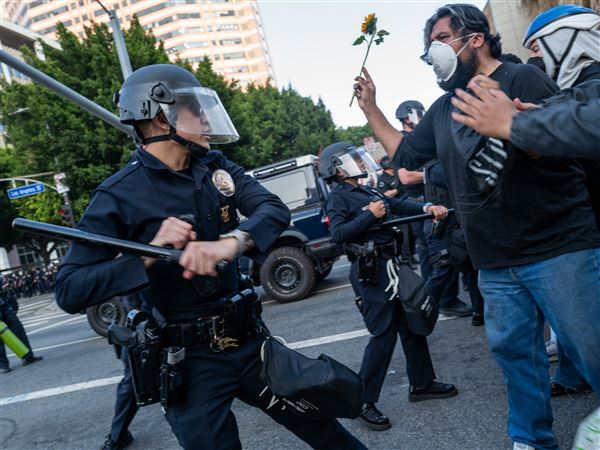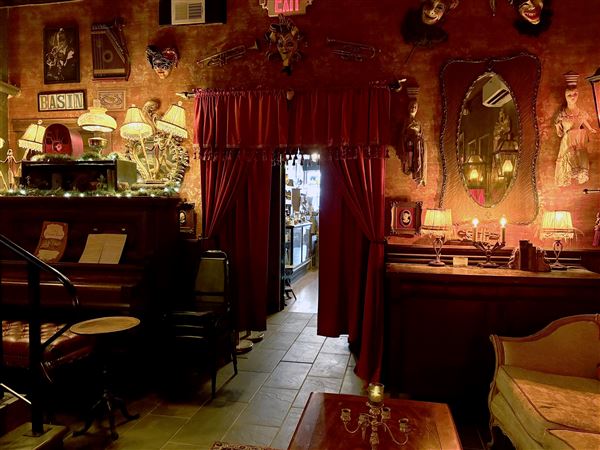Library directors, by their nature, are lovers of books and like to share them with others. So it was fitting as director of the Greensburg-Hempfield Library that Cesare Muccari helped launch a countywide system in which Westmoreland residents can download more than 800 free e-books to their iPad or e-reader.
Mr. Muccari, a Mt. Lebanon resident, knows more people are using personal devices to read books; he said more than 600 people already have used the online book downloading system.
But Mr. Muccari's interests go far beyond the library. He has been an active member of the Westmoreland County community since becoming the library director in 1987. He has served on the board of the Red Cross and the Westmoreland County Historical Society.
And he has been heavily involved in the Greensburg area Rotary, one of the biggest in the regional district. In the past five years, Mr. Muccari has spearheaded a Dictionary Project for the organization in which all third-graders in the Hempfield and Greensburg Salem school districts, as well as St. Aquinas Academy are given dictionaries at the beginning of school.
In the past couple of years, he also helped organize a spelling bee for those third-graders, as well.
Three weeks ago, 34 third-graders from all the elementary schools competed at the spelling bee at the Westmoreland County Community College campus, and the two winners were awarded iPads. All contestants received a $25 gift card to Barnes & Noble.
A decade ago, Mr. Muccari was a team leader for the annual Rotary Exchange program, where he and four non-Rotarian community members traveled for five weeks to the Sicily area of Italy.
Mr. Muccari was born in the Calabria region of southern Italy, near Sicily, and has kept up his native tongue, so his ability to speak Italian was a key asset on the trip.
"Rotary likes to promote international understanding," he said. "So, the people from this area who went learned about the culture of Italy, and individuals on the exchange meet with their counterparts in their particular area of interest, whether they are teachers, in the media or business leaders. And then that year, our Rotary district sponsored five people from Italy coming over here."
Mr. Muccari also said Rotary sponsors his district, which is made up of seven counties, will sponsor as many as 20 exchange students this year.
"We work to get the local families to house the students during the school year," he said, "and then Rotary works to make sure the foreign students get a good feel for U.S. culture by taking them to a baseball game, museums or to Washington, D.C."
In addition, Rotary has worked diligently over the years to eradicate polio worldwide, as well as respond to disasters.
Mr. Muccari came to this country with his parents when he was 6. They lived in the northeastern part of Pennsylvania, and Mr. Muccari stayed in Western Pennsylvania after graduate school at the University of Pittsburgh.
He speaks Italian when he talks with his mother and other relatives.
"The Internet really helps, too," he said. "I like to watch YouTube, where you can see Italian singers, and then I can go and look up the translation of the lyrics. That really helps me. And I like to read newspapers in Italian on the Internet, especially when there is a big news story, like when Italy won the World Cup championship a couple years ago."
He has traveled to Venice, Italy -- his favorite city -- twice.
"Venice hasn't changed in 400 years," he said. "No autos are allowed, so you walk everywhere. The whole city is like a museum. It is gorgeous and beautiful, and the biggest highway is the Grand Canal, where you can take public transportation to get around. And the food is fantastic."
He and his wife also travel frequently to Chicago and New York City, where their two children live.
Mr. Muccari was a history major in college, and he has continued his love and interest in world history.
He likes to read about different periods in history and recently read "The Diary of Samuel Pepys." Pepys was a member of the English Parliament in the 1600s who wrote about London's Great Fire, which destroyed a third of the city, and about the London Plague. Mr. Muccari says of the 50 books he'll read in a year, about 40 will be historical books.
Libraries, like all nonprofits, have struggled during the Great Recession, not only because state funds have been reduced by about 20 percent, but because their local supporters have been struggling to make ends meet as well.
Libraries have changed considerably in his nearly 25 years as director, but he is convinced they will remain vital parts of any community.
"The biggest change for libraries, of course, has been computers and technology," he said. "The Internet is an incredible source of information, and more people now have access to information in a faster way. Of course, sometimes that information can be wrong, too. Recently, Wikipedia removed some changes to its site on Paul Revere after Sarah Palin's controversial remarks that Revere was warning the British. So people have to be careful to get good information.
Mr. Muccari also said he thinks libraries in the future will act as community centers, sources of continuing education for all residents and places that provide access to information for all people; he said that is important in a democratic society.
"We have 17 computers in our Greensburg library, where anyone can come in and use the Internet for free," Mr. Muccari said. "Last year, we provided 30,000 hours of Internet access. So people -- no matter what their economic or ethnic background -- can get access to information, and that's important."
Parents will continue to depend on libraries for good children's events as well, he said.
"We do a lot of programming at our library, for children and adults," he said. "We have 400 children's programs available this summer, for pre-school through fifth grade. We welcome everyone to take advantage of them."
First Published: June 23, 2011, 1:30 p.m.
















